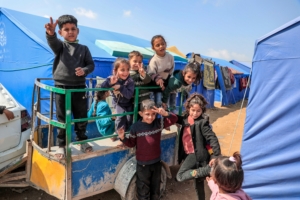Initiatives Improving Palestinian Children’s Mental Health
 As the war in Palestine continues, Palestinians’ mental health is suffering. At least 10 children lose a limb a day and 17,000 children have been separated from their parents. Additionally, 96% of Palestinian children feel that death is impending. The numerous traumatic events the children undergo at a crucial time for their development have taken a toll. However, there are some vital initiatives in place aiming to tackle and improve Palestinian children’s mental health.
As the war in Palestine continues, Palestinians’ mental health is suffering. At least 10 children lose a limb a day and 17,000 children have been separated from their parents. Additionally, 96% of Palestinian children feel that death is impending. The numerous traumatic events the children undergo at a crucial time for their development have taken a toll. However, there are some vital initiatives in place aiming to tackle and improve Palestinian children’s mental health.
MAP Mental Health Services
Medical Aid for Palestine (MAP) is addressing Gaza’s mental health challenges in collaboration with the health ministry to improve access to mental health services. MAP has set up specific locations within the city to offer psychosocial and clinical support.
MAP also utilizes the close-knit community within Gaza by implementing a peer support model, enabling individuals with lived experience of mental health challenges to offer moral support to others facing similar struggles. This approach perpetuates the belief that everyone can help each other, hopefully bringing hope.
Furthermore, the organization is training its staff in psychological first aid, ensuring that they are prepared to support others and themselves through mental health challenges regardless of their role. This initiative helps ensure that as many people receive such help as possible.
GCMHP
The Gaza Community Mental Health Program (GCMHP), currently led by Dr. Yasser Abu Jamei, provides counseling over the phone. Additionally, they visit shelters and refugee camps to provide therapy. The initiative has clinics in Gaza City, Khan Younis and Deir al Balah, offering a range of services to support patients, including talking therapy, play therapy and occupational therapy.
In 2024, the GCMHP assisted more than 26,000 people in 298 days, offering care and support to individuals and families of all ages. It has also established Psychological First Aid (PFA) teams that visit camps and shelters to reach displaced families. These teams distribute toy bags to children, encouraging them to engage in familiar and enjoyable activities promoting calmness. Additionally, the teams assess whether anyone in these camps requires urgent intervention and ensure they are referred for specialized treatment.
Education and Mental Well-Being
The occupation has led to the destruction of many schools, with approximately 87.7% of educational buildings affected as of March 30, 2024. This disruption has severely impacted Palestinian children’s education and mental health, exacerbated by food, water and electricity shortages, as well as the loss of stability and educational infrastructure.
However, individuals like Israa Abu Mustafa are working to counter these challenges. She established a school for primary-aged children in Khan Younis in September 2024, starting with 35 students and expanding to 70. Despite lacking basic equipment like desks and chairs, the children continue to learn and participate in enjoyable activities. This initiative supports their well-being by restoring normalcy and safety through education.
Summary
The psychological well-being of Palestinian children is deeply impacted. However, several initiatives are offering support by providing mental health services, education and safe spaces, helping children regain a sense of stability and hope.
– Maryam Abdalla
Maryam is based in the UK and focuses on Good News and Politics for The Borgen Project.
Photo: Unsplash
